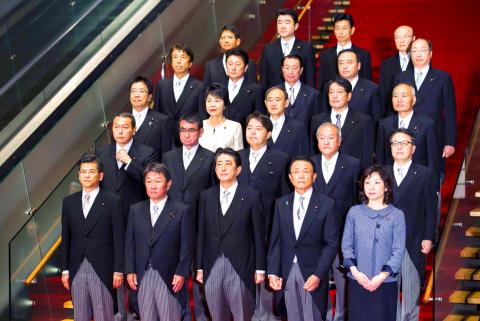Japanese Prime Minister Shinzo Abe yesterday dumped conservatives and embraced critical voices in a Cabinet revamp he hopes will stem a decline in public support after a series of scandals and missteps.
Abe, in office since December 2012, has pushed a nationalist agenda alongside a massive policy effort to end years of on-off deflation and rejuvenate the world’s third-largest economy.
However, he has seen public support rates plummet in the past few months over an array of political troubles, including allegations of favoritism to a friend in a business deal, which Abe denies.

Photo: Bloomberg
Abe’s Liberal Democratic Party (LDP) suffered a drubbing in local Tokyo elections last month, which analysts and newspapers blamed on an increasing “arrogance” on the part of the prime minister and his government.
“I would like to express deep regret and apologize to the public” for creating mistrust due to various scandals, Abe said at a televised news conference, bowing for several seconds.
Abe, dressed in formal attire after attending a ceremony with his ministers at the Imperial Palace, said he carried out the Cabinet changes to restore public confidence in his government.
“We will listen to the voices of the people and pursue politics together with them,” Abe said.
He reappointed former Japanese minister of defense Itsunori Onodera after Tomomi Inada resigned from the post last week following a scandal at the ministry over the handling of documents.
Onodera, 57, held the post for nearly two years until September 2014, and has vowed to restore unity and confidence within the ministry.
His appointment came amid rising tensions surrounding North Korea’s missile development.
Pyongyang launched its latest missile late on Friday last week.
“It’s the government’s biggest responsibility to do our best to ensure the safety of the public against this serious and real threat,” Abe said.

AGING: As of last month, people aged 65 or older accounted for 20.06 percent of the total population and the number of couples who got married fell by 18,685 from 2024 Taiwan has surpassed South Korea as the country least willing to have children, with an annual crude birthrate of 4.62 per 1,000 people, Ministry of the Interior data showed yesterday. The nation was previously ranked the second-lowest country in terms of total fertility rate, or the average number of children a woman has in her lifetime. However, South Korea’s fertility rate began to recover from 2023, with total fertility rate rising from 0.72 and estimated to reach 0.82 to 0.85 by last year, and the crude birthrate projected at 6.7 per 1,000 people. Japan’s crude birthrate was projected to fall below six,

Conflict with Taiwan could leave China with “massive economic disruption, catastrophic military losses, significant social unrest, and devastating sanctions,” a US think tank said in a report released on Monday. The German Marshall Fund released a report titled If China Attacks Taiwan: The Consequences for China of “Minor Conflict” and “Major War” Scenarios. The report details the “massive” economic, military, social and international costs to China in the event of a minor conflict or major war with Taiwan, estimating that the Chinese People’s Liberation Army (PLA) could sustain losses of more than half of its active-duty ground forces, including 100,000 troops. Understanding Chinese

US President Donald Trump in an interview with the New York Times published on Thursday said that “it’s up to” Chinese President Xi Jinping (習近平) what China does on Taiwan, but that he would be “very unhappy” with a change in the “status quo.” “He [Xi] considers it to be a part of China, and that’s up to him what he’s going to be doing, but I’ve expressed to him that I would be very unhappy if he did that, and I don’t think he’ll do that. I hope he doesn’t do that,” Trump said. Trump made the comments in the context

SELF-DEFENSE: Tokyo has accelerated its spending goal and its defense minister said the nation needs to discuss whether it should develop nuclear-powered submarines China is ramping up objections to what it sees as Japan’s desire to acquire nuclear weapons, despite Tokyo’s longstanding renunciation of such arms, deepening another fissure in the two neighbors’ increasingly tense ties. In what appears to be a concerted effort, China’s foreign and defense ministries issued statements on Thursday condemning alleged remilitarism efforts by Tokyo. The remarks came as two of the country’s top think tanks jointly issued a 29-page report framing actions by “right-wing forces” in Japan as posing a “serious threat” to world peace. While that report did not define “right-wing forces,” the Chinese Ministry of Foreign Affairs was